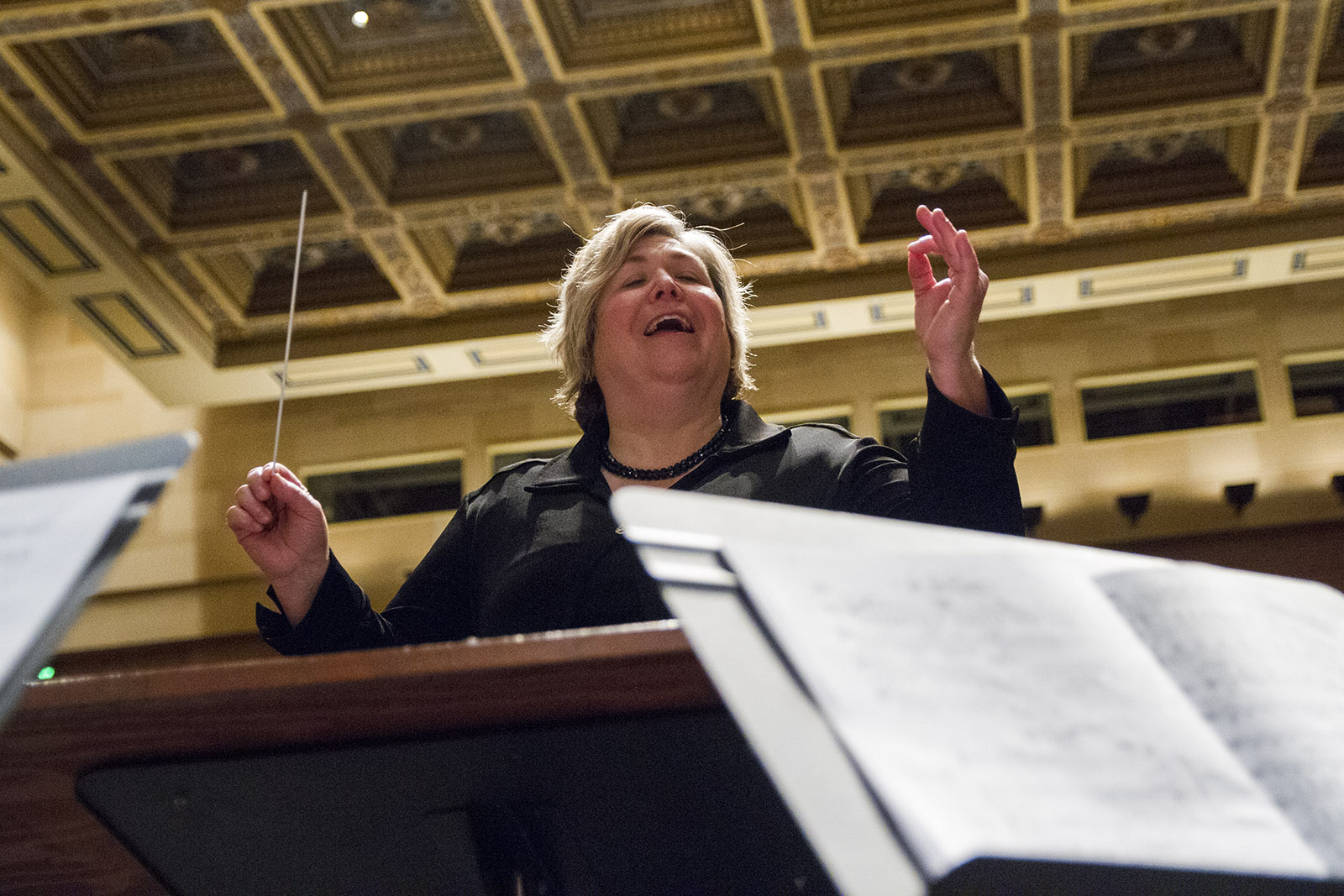Q&A: Director talks UCLA production of comedy piece based on medieval poetry

UCLA choral director Lesley Leighton will conduct the UCLA Choral Union and UCLA Philharmonia’s performance of “Carmina Burana” on Thursday in Royce Hall. (Ken Shin/Daily Bruin)
By Daniel Maraccini
March 9, 2016 11:58 p.m.
The 12th movement of “Carmina Burana” tells the story of a once-beautiful swan being roasted on a spit. As the swan gets closer to being fully cooked, the movement progresses in speed and provides a fun and challenging test for choir students, said Lesley Leighton, a choral director at the UCLA Herb Alpert School of Music.
The UCLA Choral Union will join UCLA Philharmonia for a rendition of Carl Orff’s most famous piece Thursday at Royce Hall. The early 20th-century work is based on a book of medieval poetry, whose texts are written in Latin, German and French, and uses humor to comment on the random nature of fate.
The Daily Bruin’s Daniel Maraccini spoke with Leighton on how she prepared her choir for the performance, the challenges of singing this piece and why she enjoys directing students.
Daily Bruin: What made you want to conduct “Carmina Burana”?
Lesley Leighton: I’ve performed the work a lot, as a singer and as a conductor. And I just thought it’d be fun to conduct. I also thought it would be good for our students here to sing the piece. I think they’ve enjoyed the preparation of it. It’s easily within their grasp in terms of level.
DB: Why did you think this would be a good piece for the students?
LL: The piece is pretty hilarious; the texts go from innocent texts talking about how wonderful the spring is to some pretty out-there sexual connotation texts. That was the other thing. It’s also a piece that you can do at a university, because the kids are old enough to get it, they’re old enough not to get the giggles about it and you know they’re old enough to understand the poetry and to be entertained by it.
DB: When there’s that kind of humor, is it easier for college students to connect with the piece?
LL: Oh, yeah. I mean, (during rehearsals) these guys are always grinning … You have to remember that the poetry is medieval poetry, so you know the poetry was written at a time when the church would have frowned upon such a text. And (Orff) means it, I think, in an entertaining and funny way.
DB: Is the text for this piece identical to the original medieval poetry?
LL: Not exact, but it’s pretty close. There are some places where (Orff) made some shifts. And if I remember correctly, he left some stuff out. But it’s kind of a kick of a piece. If you take it really, really seriously, I think you kind of miss the point. Does he want it sung well and played well? Naturally. So we’re serious in that way: in the presentation of it. But how could you possibly look at that text and think for one minute that Orff was being terribly, terribly serious about that text, because I don’t think he was.
DB: Does the humor of the piece relieve some of the pressure when you’re performing?
LL: You’d have to ask the choir members, but I don’t think they feel terribly pressured. They’re ready. I mean, they really are ready to sing this. They’ve had 10 weeks. They know the piece well; it’s clear they know the piece well. I think at this point they’re having fun, because as a singer – and I know this having sung it myself – it’s really a fun piece to sing.
DB: Is preparing for a concert in a foreign language much different than preparing for a piece that is written in English?
LL: Well, you have to plan that it’s going to take longer … and let’s remember that not everyone in here is a native speaker of English either, but certainly no one is a native speaker of archaic poetry. So you have to factor that in when you start thinking about preparation.
DB: Why do you like working with student choirs so much?
LL: It’s a couple of things. I think I love teaching kids. I love seeing when they discover a brand new piece of music how excited they get. So for example, with this piece, which to me is old hat in a way, I’m getting to experience it through their eyes, which is brand new.


